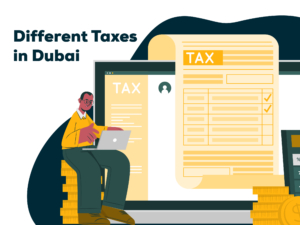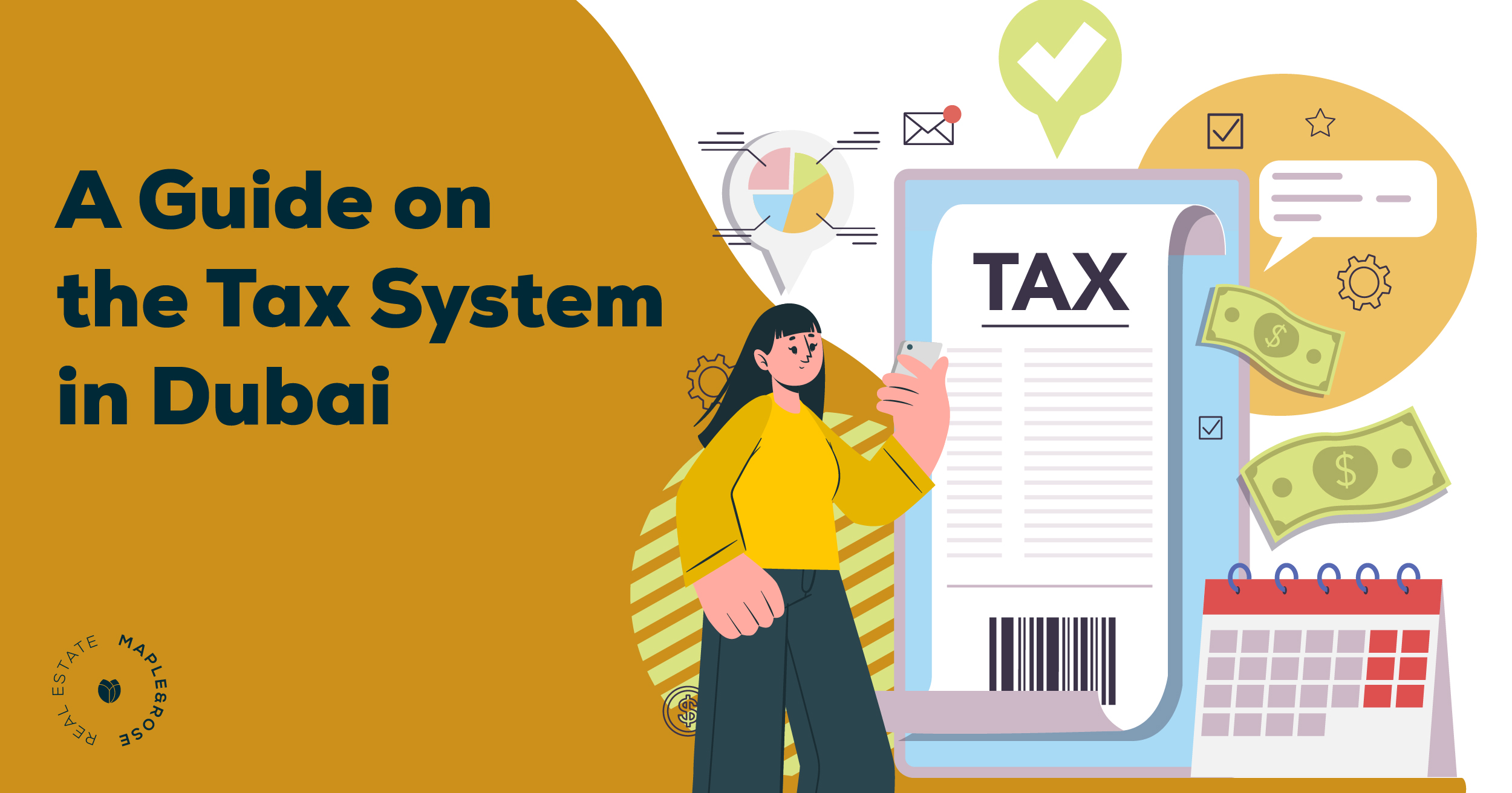The most exciting aspect of the UAE’s tax system is the idea that there are no taxes. This notion has always been a significant pull for foreign residents – especially the concept that they are not liable to pay any income tax on their hard-earned salaries in the Emirates. Although most of this understanding is accurate, there are several hidden and miscellaneous taxes that residents still need to pay, either in an individual capacity or as a business owner/entrepreneur/corporate. Thus, today we explore in detail the tax system in Dubai for a better grip on the different kinds of taxes here.
Dubai, and generally, UAE’s tax system is interesting. While it grants much freedom to the individual, it does not allow some people to escape paying taxes under specific circumstances. Let’s learn about Dubai’s various types of taxes – that you have to and don’t have to pay.
Different Taxes in Dubai

Income Tax
The good news is UAE charges no tax on an individual’s income. Thus, there are no income tax returns that you must file. This law holds for both local and foreign employees working in Dubai. It also applies to the income earned by freelancers and those who are self-employed.
There is also no tax liable on benefits and compensations that employees receive from their employers.
Social Security for GCC Nationals
The nationals of the Gulf Cooperation Council (GCC) member countries must pay a social security of 17.5%. The UAE is also a member of the GCC, and UAE nationals are required to pay only 5% of this social security regime, wherein their employers pay the remaining 12.5%.
The social security regime is also obligatory for employees of companies registered in the free trade zones. However, non-GCC nationals are not subject to social security.
Property Ownership Tax
There is no property ownership tax in Dubai unless the property is a company that is liable to pay an income tax or commercial tax.
Despite there being no ownership tax, the buyer has to pay other types of fees when they acquire a new property. These are as follows:
- Transfer Fee: 4%
- Registration Fee: AED 2000 for properties worth less than the value of AED 500K
AED 4000 for properties worth more than the value of AED 500K
- Administration Fee: AED 580
- Ownership Certificate Fee: AED 250
- VAT: 5%
After the payment of the above fee, the property owner does not need to pay an annual ownership tax, although they still have to pay a yearly maintenance fee.
Inheritance Tax
There is no tax on inherited wealth or gifts in Dubai or the UAE.
Corporate Tax
A corporate tax is levied on certain companies in Dubai. These include oil companies and foreign banks. Companies registered in the free trade zones are exempted from this tax. After the 1st of June 2023, a federal corporate tax will be levied on businesses with net profits of AED 375,000 and more. This tax will be charged at a flat rate of 9%.
Rental Tax
In Dubai, residential tenants must pay 5% of their annual rent in tax, and commercial tenants must pay 10%.
This is called the municipal tax and is in addition to the utility bills tenants must pay.
VAT
The value-added tax, or VAT for short, is a tax that applies to goods and services. The UAE charges a flat rate of 5% VAT. Certain items are exempt from VAT. These include food products, health services, educational and social services, and international transportation.
VAT is also obligatory for companies earning more than AED 375,000.
Excise Tax
From 2017 onwards, the UAE government levied an indirect tax on goods considered harmful to human health or the environment. The excise tax on different products in the UAE is as follows:
- Carbonated Drinks: 50%
- Energy Drinks with stimulating substances: 100%
- Tobacco and tobacco products: 100%
- The excise tax is obligatory for companies that manufacture, store, or import any excise product.
Import and Export Tax
The UAE applies import tax on products sourced from overseas. A surcharge of 5% of an item’s cost, insurance, and freight is calculated as customs duty. Harmful products like tobacco and alcohol are imported with a 50 to 100% import tax. However, imported goods in the free trade zones are exempt from an import tax.
There is no export tax in all of the UAE, including Dubai.
Tax Policy for Foreigners
There is no income tax on foreigners working in the UAE. However, they are required to pay taxes in their home countries.
The UAE government has entered into Double Tax Treaties with several countries whose residents work here as employees. Through these treaties, tax information can easily be exchanged between two countries. Under such an agreement, an employee working in the UAE can pay tax in the UAE and get a tax deduction in their home country.
Tourist Tax
If you’re visiting Dubai as a tourist, you must pay tourism tax. Tourist facilities in Dubai charge tax on different services. These are:
- Room Tax: 10%
- Service Charge: 10%
- Municipal Tax: 7%
- City Tax: 6-10%
- Tourism Dirham Fee: AED 7-20
- Tourism Fee: 6%
Free Trade Zones

There are several Free Trade Zones in the UAE, with most of them in Dubai. These areas have special tax and customs regimes. Investors seek free trade zones when setting up their businesses or investments in Dubai. This is because of the following primary benefits:
- No corporate tax for up to 50 years
- No VAT
- No customs fee
Wrap Up
UAE is one of the few countries where residents don’t have to bear a complicated tax system and daunting procedures. It is a great place to relocate if one wants to accumulate wealth and enjoy maximum returns on their investments.
Although there are not many taxes to deal with, getting the help and advice of financial advisors will always help residents, entrepreneurs, and investors in their financial transactions in Dubai.
Get in touch with us to learn more








